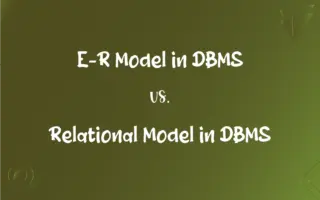Dwarfism vs. Cretinism: What's the Difference?
Edited by Aimie Carlson || By Harlon Moss || Published on February 6, 2024
Dwarfism is a condition resulting in short stature, often due to genetic factors. Cretinism is a disorder caused by thyroid hormone deficiency, leading to physical and mental development issues.

Key Differences
Dwarfism is primarily characterized by short stature, typically resulting from genetic mutations affecting bone growth. Cretinism, on the other hand, is a congenital condition caused by a deficiency in thyroid hormones, impacting physical and cognitive development.
Individuals with dwarfism often have proportionate body structures, although some forms can lead to disproportionate limb-to-body ratios. In cretinism, the lack of thyroid hormones can result in developmental delays, stunted growth, and intellectual disabilities.
Dwarfism can be diagnosed through genetic testing and observation of growth patterns. Cretinism, also known as congenital hypothyroidism, is typically identified through newborn screening tests.
Treatment for dwarfism focuses on managing symptoms and complications; there's no cure for the underlying genetic causes. Cretinism requires early and ongoing treatment with thyroid hormone replacement to prevent severe developmental issues.
Social and emotional support is crucial for individuals with dwarfism, as they may face unique challenges in daily life. Early intervention and support are also critical for children with cretinism to achieve the best possible developmental outcomes.
ADVERTISEMENT
Comparison Chart
Cause
Genetic mutations affecting bone growth.
Thyroid hormone deficiency, usually congenital.
Primary Symptom
Short stature.
Stunted growth, developmental delays.
Body Proportions
Often proportionate, varies with type.
Disproportionate due to delayed development.
Diagnosis
Genetic testing, growth observation.
Newborn screening, thyroid function tests.
Treatment
Symptom management, no cure for genetic cause.
Thyroid hormone replacement therapy.
ADVERTISEMENT
Dwarfism and Cretinism Definitions
Dwarfism
Requires adaptations in daily living due to stature.
Schools often make accommodations for students with dwarfism.
Cretinism
Typically detected through newborn thyroid screening.
Early detection of cretinism is crucial for treatment.
Dwarfism
Characterized by an adult height under 4 feet 10 inches.
She was diagnosed with dwarfism at an early age.
Cretinism
Can result in stunted growth and cognitive impairment.
Untreated cretinism often leads to lifelong intellectual disabilities.
Dwarfism
A medical condition resulting in significantly short stature.
Despite his dwarfism, he excels in various sports.
Cretinism
Requires lifelong thyroid hormone replacement therapy.
She manages her cretinism with regular medication.
Dwarfism
Often genetic, leading to reduced growth of bones.
Dwarfism in her family is due to a rare genetic mutation.
Cretinism
A condition caused by severe thyroid hormone deficiency.
Cretinism can lead to significant developmental delays if untreated.
Dwarfism
Can be proportionate or disproportionate in body structure.
His type of dwarfism results in proportionate limbs and torso.
Cretinism
Associated with both physical and mental developmental issues.
Children with cretinism need early and ongoing support for optimal development.
Dwarfism
The medical condition of being a dwarf.
Cretinism
A congenital condition caused by a deficiency of thyroid hormone during prenatal development and characterized by small stature, intellectual disability, dystrophy of the bones, and a low basal metabolism.
Dwarfism
The condition of being a dwarf animal or plant. In both senses also called nanism.
Cretinism
(disease) A condition of severely stunted physical and mental growth due to the untreated congenital deficiency of thyroid hormones.
Dwarfism
The condition of being a dwarf person of short stature.
Cretinism
A condition of endemic or inherited idiocy, accompanied by physical degeneracy and deformity (usually with goiter), frequent in certain mountain valleys, esp. of the Alps.
Dwarfism
The quality of being puny or inferior.
Cretinism
Severe hypothyroidism resulting in physical and mental stunting
Dwarfism
A genetic abnormality resulting in short stature
FAQs
How is cretinism treated?
Cretinism is treated with thyroid hormone replacement therapy.
What causes dwarfism?
Dwarfism is usually caused by genetic mutations affecting bone growth.
Can cretinism be prevented?
Early detection and treatment can prevent the severe effects of cretinism.
What are the symptoms of cretinism?
Symptoms of cretinism include stunted growth, developmental delays, and intellectual disability.
What challenges do individuals with dwarfism face?
Individuals with dwarfism may face physical and social challenges due to their stature.
Is dwarfism hereditary?
Some forms of dwarfism are hereditary, while others occur due to spontaneous mutations.
Is cretinism common?
Cretinism is relatively rare, especially in areas with newborn screening programs.
How early can cretinism be detected?
Cretinism can be detected shortly after birth through newborn screening tests.
What leads to cretinism?
Cretinism is caused by a deficiency in thyroid hormones, often congenital.
Can dwarfism be cured?
There is no cure for the genetic causes of dwarfism, but symptoms can be managed.
What is the prognosis for someone with cretinism?
With early treatment, individuals with cretinism can lead healthy lives, although some developmental issues may persist.
What is the life expectancy for someone with cretinism?
With proper treatment, individuals with cretinism can have a normal life expectancy.
How is dwarfism diagnosed?
Dwarfism is diagnosed through genetic testing and monitoring growth patterns.
Can people with dwarfism lead normal lives?
Yes, people with dwarfism can lead normal, active lives with appropriate support.
Are there different types of dwarfism?
Yes, there are various types of dwarfism, each with distinct characteristics.
Can cretinism be cured?
While cretinism cannot be cured, its effects can be significantly mitigated with early treatment.
Is there a genetic test for dwarfism?
Yes, genetic testing can identify mutations associated with certain types of dwarfism.
Can cretinism affect physical appearance?
Yes, cretinism can affect physical appearance, including facial features and growth patterns.
How does dwarfism affect daily life?
Dwarfism may require adaptations in daily life, including modifications to living spaces and transportation.
Do people with dwarfism have normal intelligence?
Yes, people with dwarfism typically have normal intelligence.
About Author
Written by
Harlon MossHarlon is a seasoned quality moderator and accomplished content writer for Difference Wiki. An alumnus of the prestigious University of California, he earned his degree in Computer Science. Leveraging his academic background, Harlon brings a meticulous and informed perspective to his work, ensuring content accuracy and excellence.
Edited by
Aimie CarlsonAimie Carlson, holding a master's degree in English literature, is a fervent English language enthusiast. She lends her writing talents to Difference Wiki, a prominent website that specializes in comparisons, offering readers insightful analyses that both captivate and inform.







































































